Affiliate Disclosure: I earn commissions if you shop through the links below at no additional cost to you.
Last Updated on February 1, 2026 by Jeremy
Crossing the US Canada border with an RV is usually easy… until it’s not. One missing document, one snack you didn’t think counted, or one pet rule you didn’t realize changed, and suddenly you’re doing the awkward “hold on, it’s in here somewhere” shuffle at the booth. This guide keeps it simple, practical, and current for 2026 so your crossing feels boring (the best outcome).
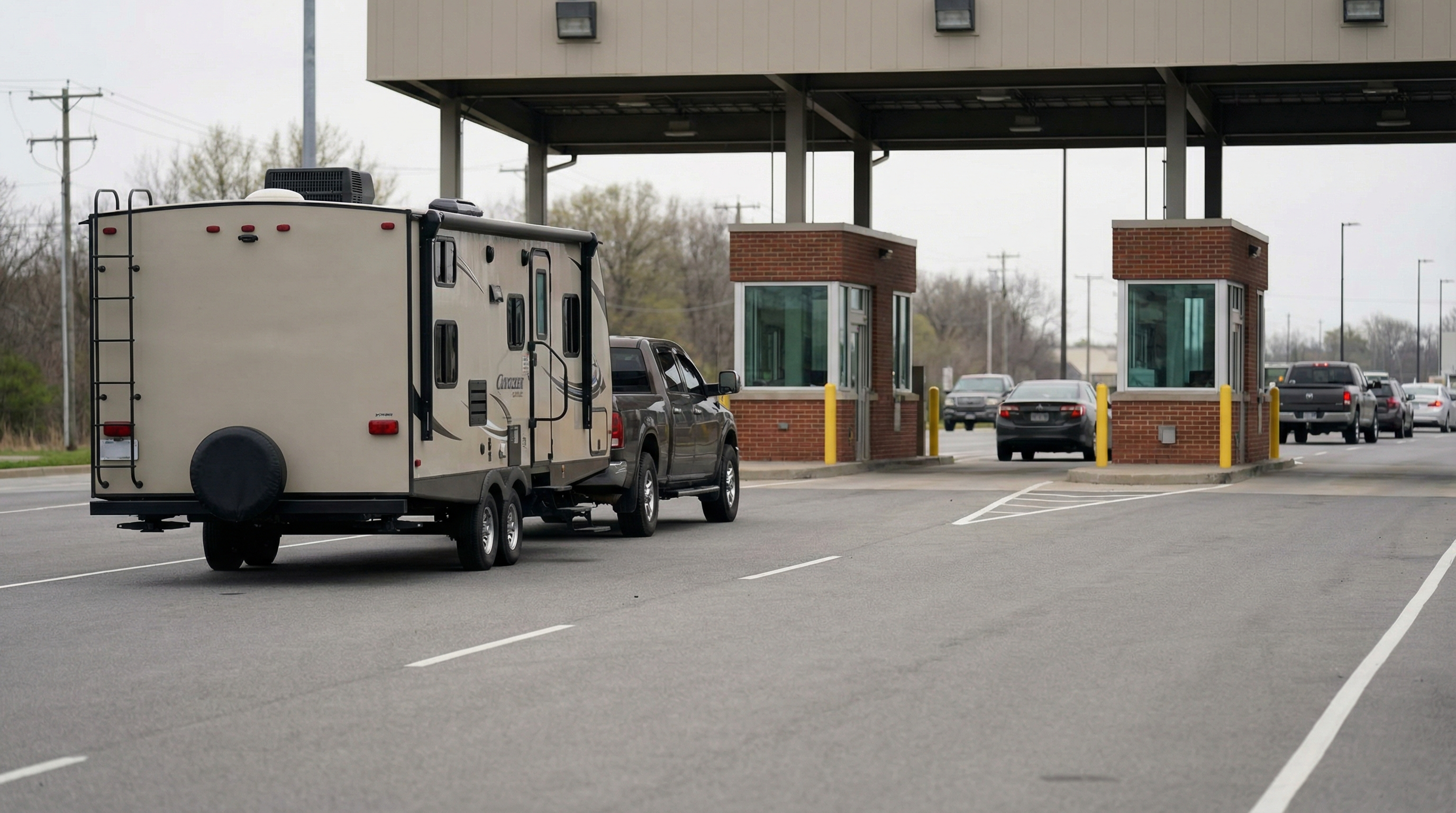
2026 Border Checklist for RVs and Travel Trailers
This is the “make it boring” checklist. Print it, screenshot it, or keep it open on your phone when you’re lining up.
Printable version (on-page)
Use the print button below. It hides the images and keeps only the checklist content.
Checklist visual
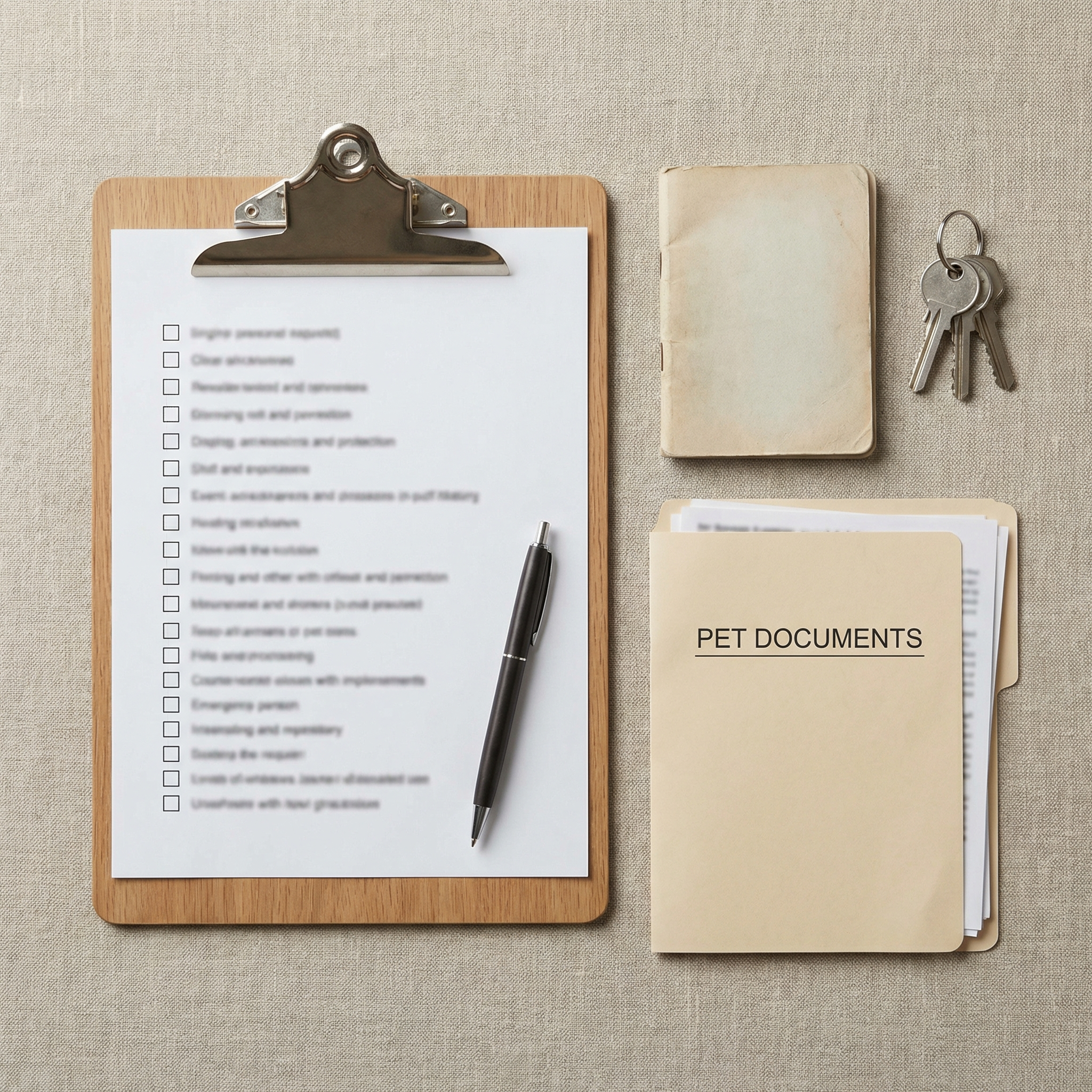
People + documents
- Passport / passport card / NEXUS / eligible enhanced ID (as applicable)
- Minors: consent letter if one parent/guardian isn’t present
- Address for your first stop (campground, hotel, family, etc.)
- Receipts for major purchases (and a rough total)
RV + trailer
- Registration + proof of insurance (tow vehicle + RV + trailer)
- If financed/leased: written permission letter from lender/lienholder
- If borrowed: owner permission letter (notarized is even better)
- Know what’s in your exterior compartments (they do ask)
Food + restricted items
- Declare all food, alcohol, and agricultural items (even if it’s “just snacks”)
- Avoid guessing with fresh produce/meat unless you verified current rules
- Do not cross with cannabis/CBD products
- Prescription meds: keep in original containers when possible
Pets
- Rabies certificate (dogs + cats)
- For dogs entering the U.S.: CDC Dog Import Form requirements may apply
- Stick to commercially packaged pet food (skip raw)
- Leash/harness ready in case you’re asked to step out
Fast “booth answers” that keep things smooth
- Where are you going? (first stop is enough)
- How long are you staying?
- What are you bringing back / what did you buy?
- Any food, alcohol, tobacco, firearms/weapons, or cannabis/CBD?
Border Crossing Requirements for RVs and Travel Trailers
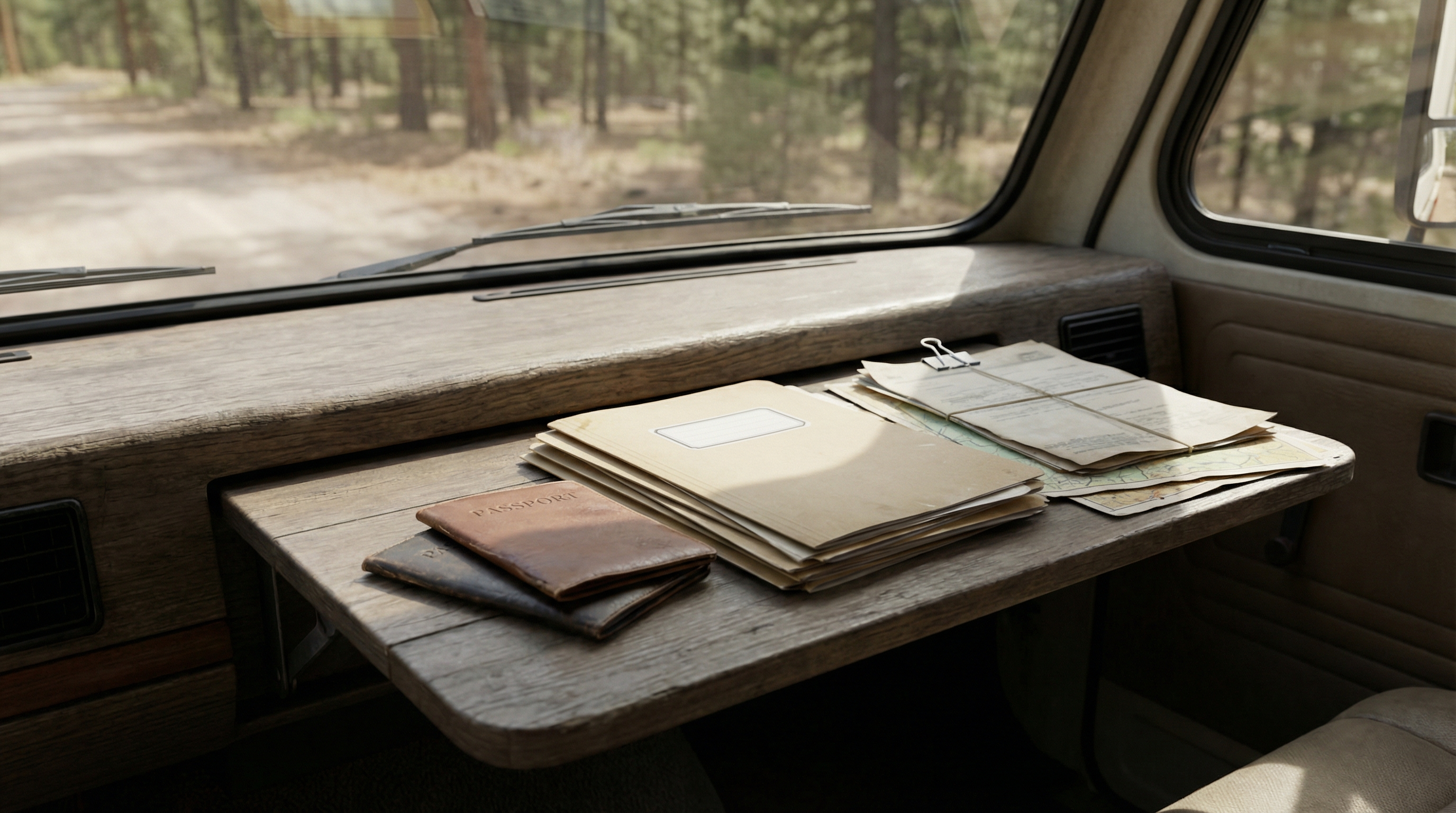
1) Valid identification and travel documents
The cleanest play is still a passport. Other document options may be valid for land/sea travel depending on your citizenship and circumstances (for example, certain trusted traveler cards or eligible enhanced IDs).
Common options RVers use
- Passport (most universal)
- Trusted traveler card (like NEXUS) if you cross often
- Eligible enhanced ID where available (confirm first)
Traveling with minors
If one parent/guardian isn’t present, carry a signed consent letter (and custody documents if relevant). Extra questions are normal when documentation is thin.
2) Vehicle registration and insurance
- Registration + proof of insurance should be easy to access
- If financed/leased: bring written permission from the lender/lienholder
- If borrowed: written permission from the owner is strongly recommended
- Rental RV/trailer: keep the rental agreement and insurance paperwork handy
3) Temporary import basics
Most RV trips are temporary entry as long as you’re visiting and bringing your rig back home. The friction usually shows up when ownership is unclear, documents are missing, or restricted goods are involved.
What to Expect at the Booth (and Why RVs Get Asked More Questions)
RVs and trailers carry more stuff. More stuff means more follow-up questions. That’s not “you’re in trouble,” it’s just reality.
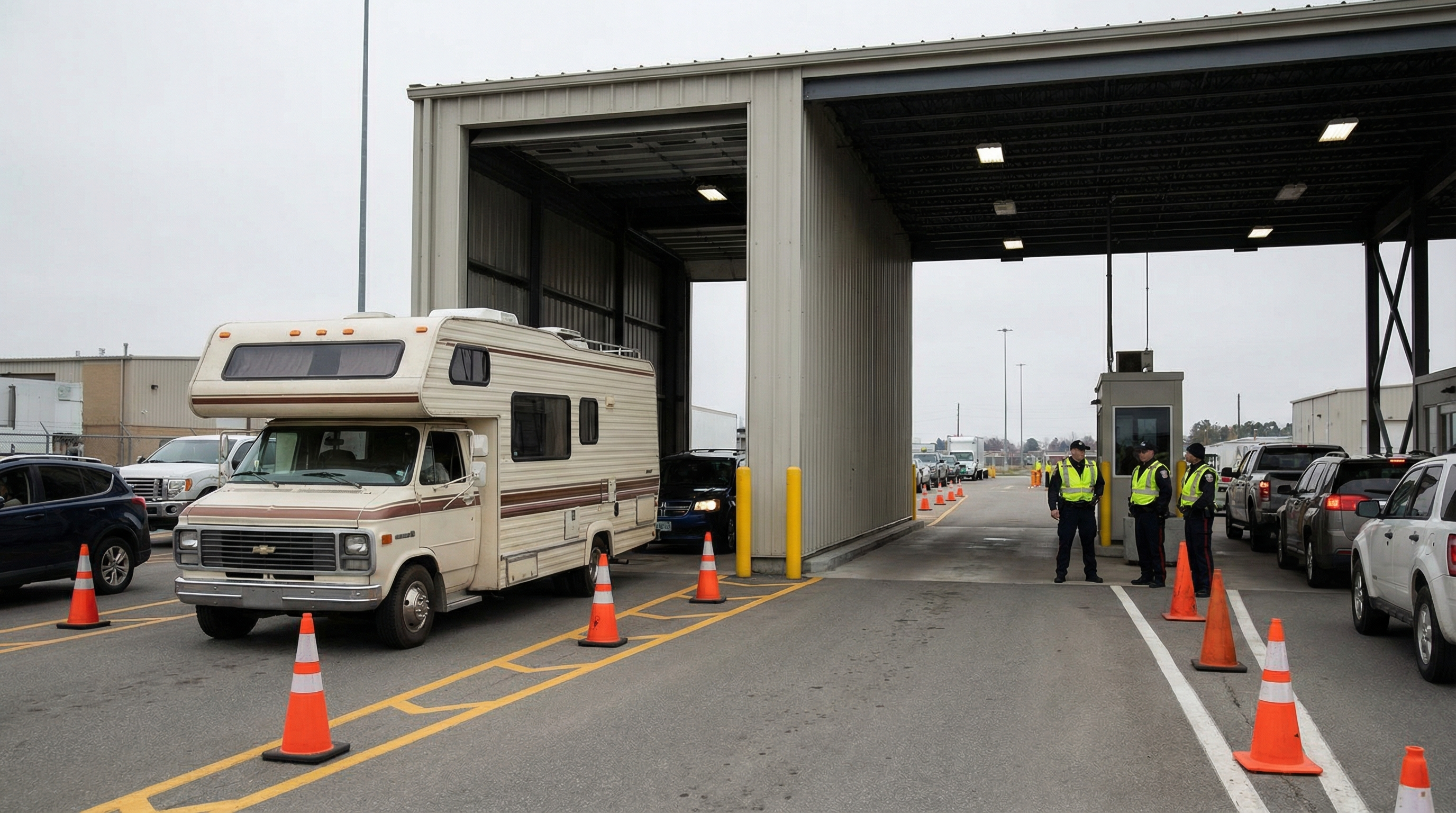
Common questions you’ll hear
- Where are you going and for how long?
- Any food, alcohol, tobacco, firearms/weapons, cannabis/CBD?
- Are you carrying pepper spray, bear spray, or protection items?
- Who owns the RV and trailer?
Secondary inspection isn’t the end of the world
Secondary is often about verification or a closer look at items. Stay calm, answer directly, and don’t treat it like a courtroom drama. Most delays come from disorganization or inconsistent answers.
Canada vs U.S. RV Border Crossing Differences
Here’s the quick comparison RVers usually wish they had before pulling into the line. Always verify sensitive categories using the official links in the next section.
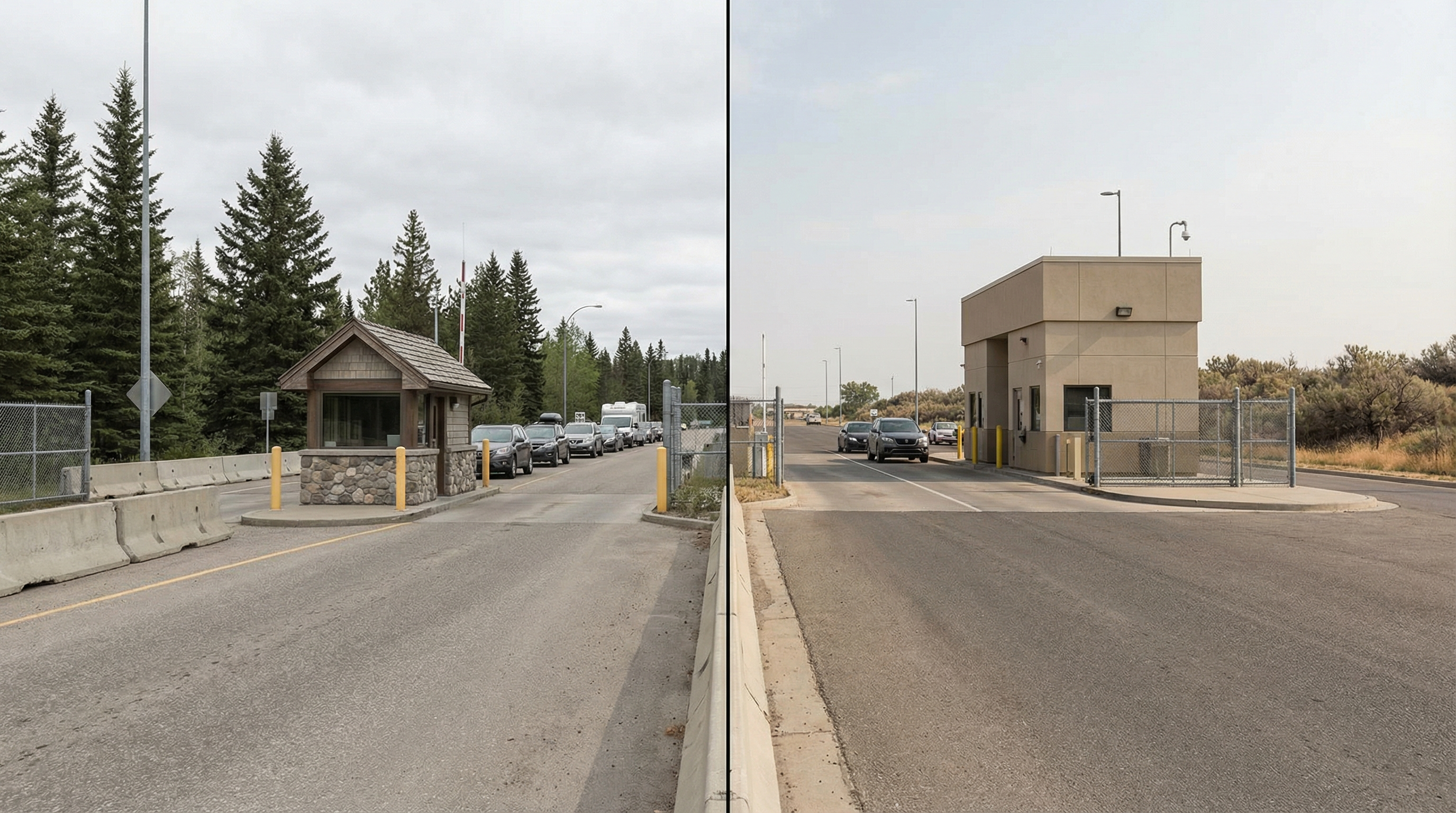
| Topic | Entering Canada | Entering the U.S. |
|---|---|---|
| Documents | Passport is the simplest universal option; other options depend on traveler type. | Land/sea entry follows WHTI document rules (passport, trusted traveler cards, eligible enhanced IDs where applicable). |
| Food & agriculture | Declare all food/plant/animal products; restrictions can change quickly. | Declare all food items; certain meats/agriculture can trigger extra scrutiny. |
| Cannabis/CBD | Do not bring it in or take it out across the border. | Still illegal federally; don’t cross with it. |
| Pets (dogs) | Rabies proof commonly required; follow CFIA guidance by species/origin. | CDC dog requirements can include a CDC Dog Import Form and additional rules depending on travel history. |
| Cash / money reporting | Large amounts must be declared; don’t assume “it’s my money” means “no rules.” | Large amounts must be declared; same concept, different process. |
Customs Regulations & Prohibited Items

1) What you must declare
- Purchases and gifts
- Food, plant, and animal products (snacks count too)
- Alcohol and tobacco
- Pets and pet food
- Currency/monetary instruments above reporting thresholds
2) What’s not worth risking
- Cannabis/CBD: do not attempt to cross with it in any form (including CBD products).
- Food/agriculture guessing: declare everything, verify fresh produce/meat rules before you travel.
- Weapons/protection items: rules vary and can be strict. Verify before you arrive if you carry anything for “protection.”
2026 “Quiet Problems” That Cause Loud Delays
These are the things people forget to think about because they’re normal in RV life. They’re also the things that can trigger extra questions.
Prescription medications
- Keep meds in original containers when possible
- If you carry controlled prescriptions, keep documentation handy
- Don’t try to “simplify” by putting everything into one unmarked bottle
Cash and large amounts
- If you’re traveling with a large amount of cash, declare it
- This applies even if it’s your money and for a legitimate reason
Propane, fuel cans, and “RV stuff”
- Propane on an RV is normal. Extra fuel cans can draw questions.
- If you carry jerry cans, keep them secured and be ready to explain use-case.
Devices and data
- Lock your phone (PIN/biometrics), keep backups, and know what accounts are logged in
- Avoid traveling with anything that looks like “work equipment for sale” if it’s personal use
How to Avoid Long Border Wait Times
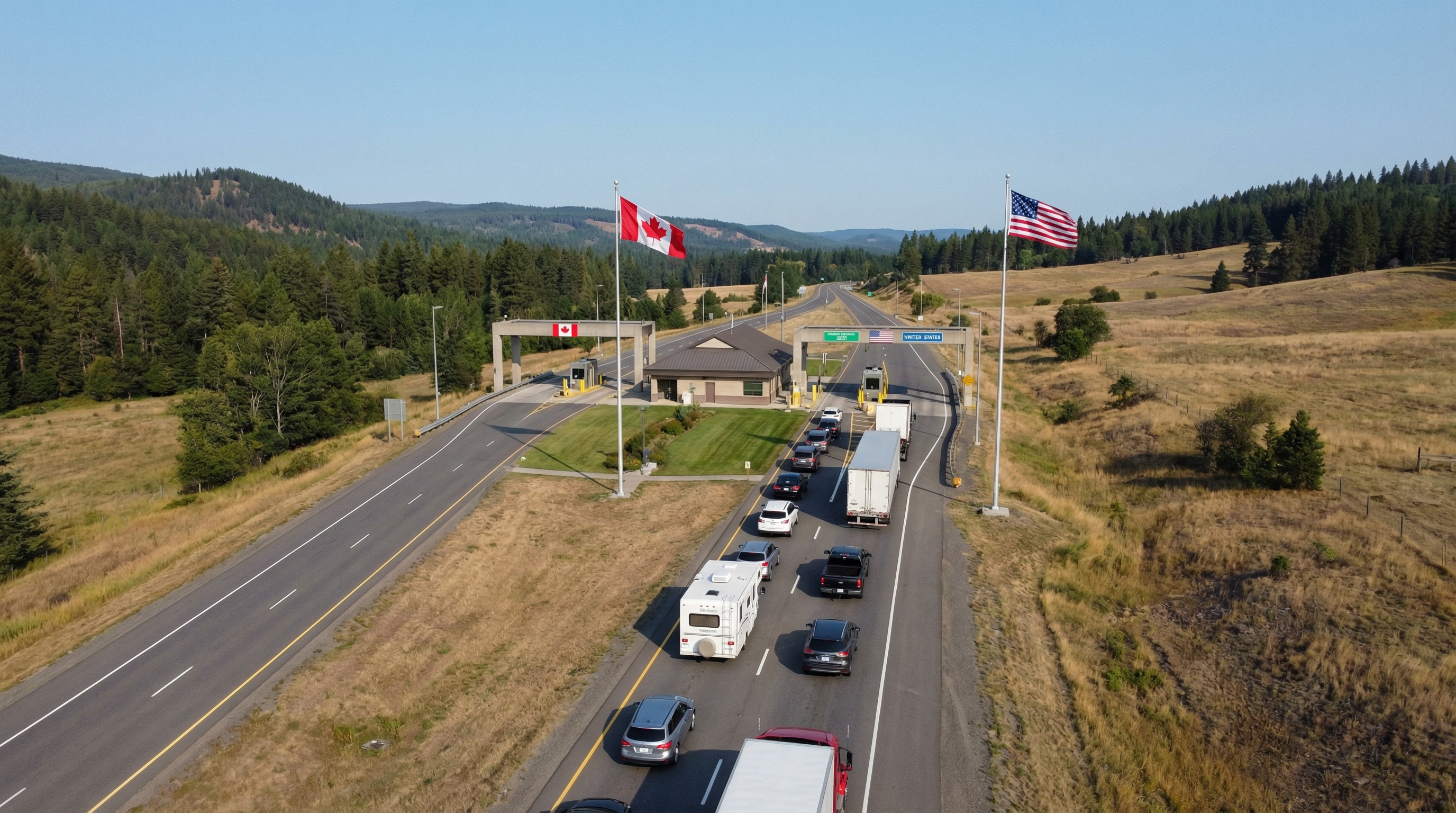
Timing that usually helps
- Often best: early mornings and mid-week crossings
- Often worst: Friday evenings, weekend afternoons, and long-weekend return traffic
Pick the right crossing, not the closest one
Not all crossings are created equal. Some are fast most days. Some are consistently slammed. If you’re towing, a slightly longer route to a calmer crossing can be a win.
Traveling With Pets in 2026
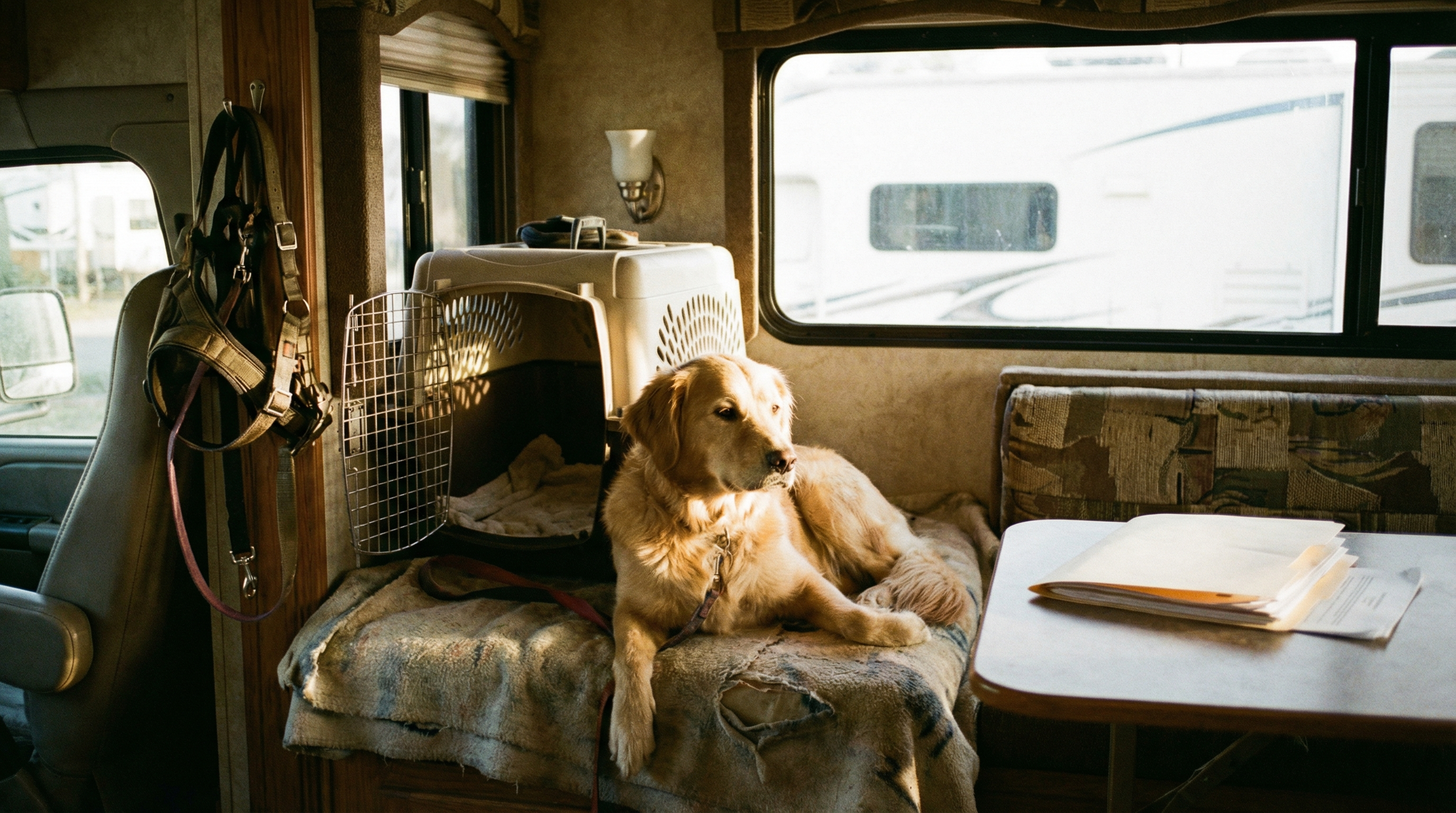
Most pet crossings are smooth when you have documentation ready. In 2026, the key is not guessing on dog entry requirements to the U.S.
Core pet paperwork
- Rabies vaccination certificate for dogs and cats (issued by a licensed vet)
- Keep paperwork accessible, not buried under campground receipts
Dogs entering the U.S.
- CDC dog requirements may apply, including the CDC Dog Import Form
- Extra requirements can apply depending on travel history
- Official reference: CDC Dog Import Form instructions
Pet food
Stick with commercially packaged kibble or canned food. Skip raw pet food when crossing. If you’re crossing frequently, check current import restrictions because they can change based on disease/outbreak conditions.
Legal & Identity Protection for Frequent Crossers
If you cross often, a small issue can become a big time sink fast. This is less about “expecting problems” and more about having a plan for the “what if” moments.
LegalShield
- Useful for guidance when rules and paperwork get complicated
- Helps you prep documents ahead of time (permission letters, etc.)
- Good fit for frequent crossers who want clarity without guessing
IDShield
- Travel often means more logins, more WiFi, and more data exposure
- Monitoring/alerts help you catch issues earlier
- Better to react early than clean up identity damage later
Going South Instead?
If your route continues past the U.S. and you’re heading toward Mexico (and eventually Central America), this is the next corridor guide to bookmark before you roll.
Next corridor guide
Step-by-step and checklist-driven, built for RVs and travel trailers.
What changes when you go south
- Paperwork becomes more step-based (multiple stops and windows)
- Cash in small bills becomes more important
- Border “helpers” can appear fast, so clarity matters
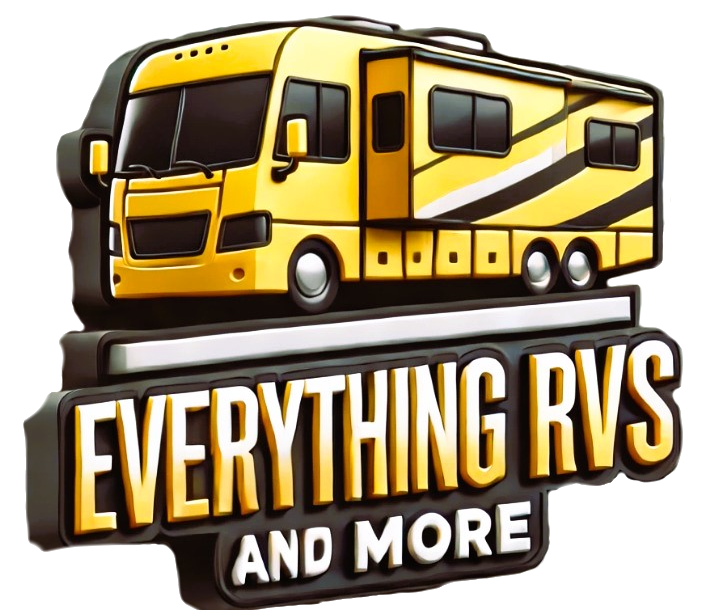

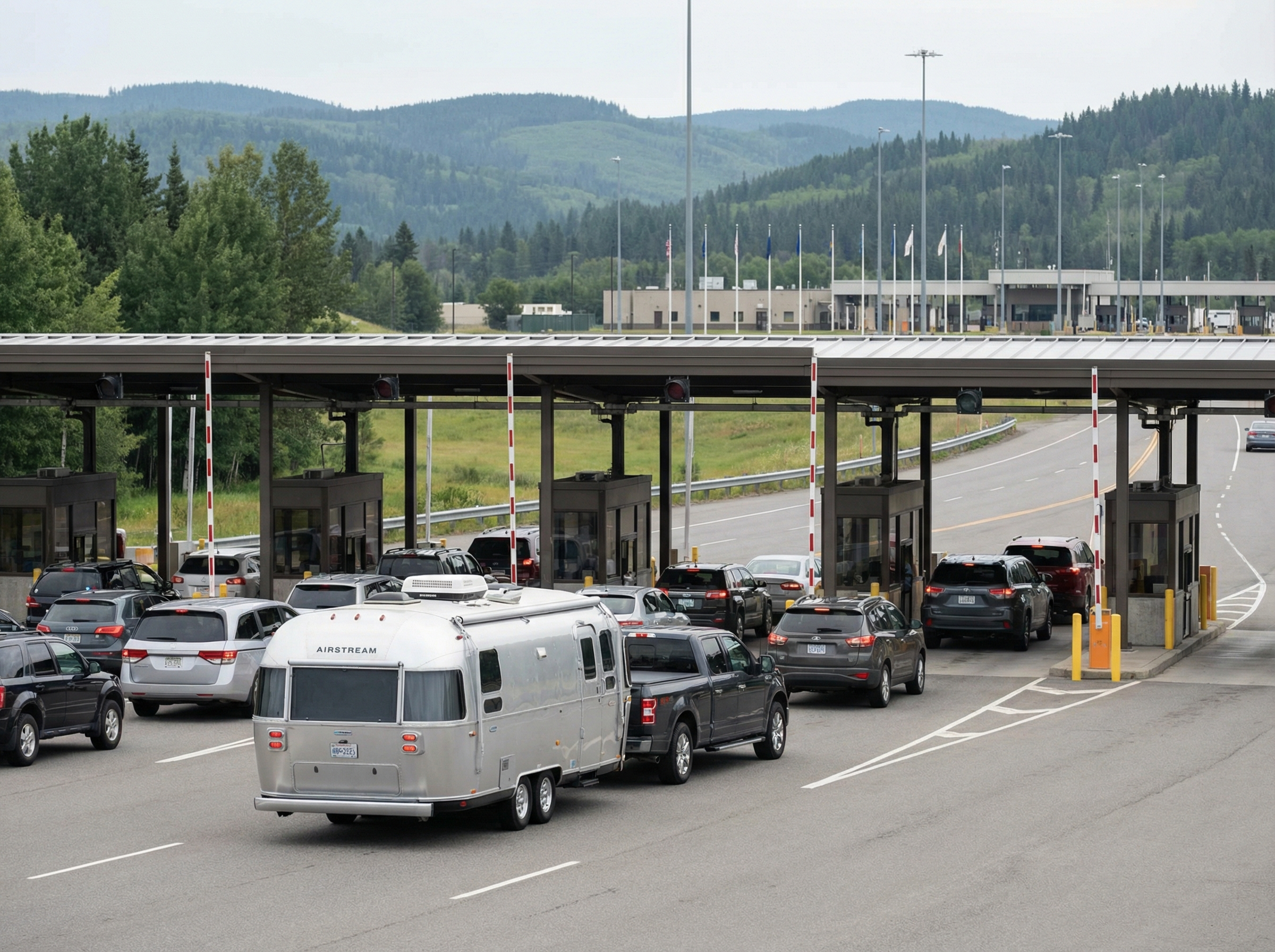



.jpg/:/cr=t:5.56%25,l:0%25,w:100%25,h:88.89%25/rs=w:1240,h:620,cg:true)



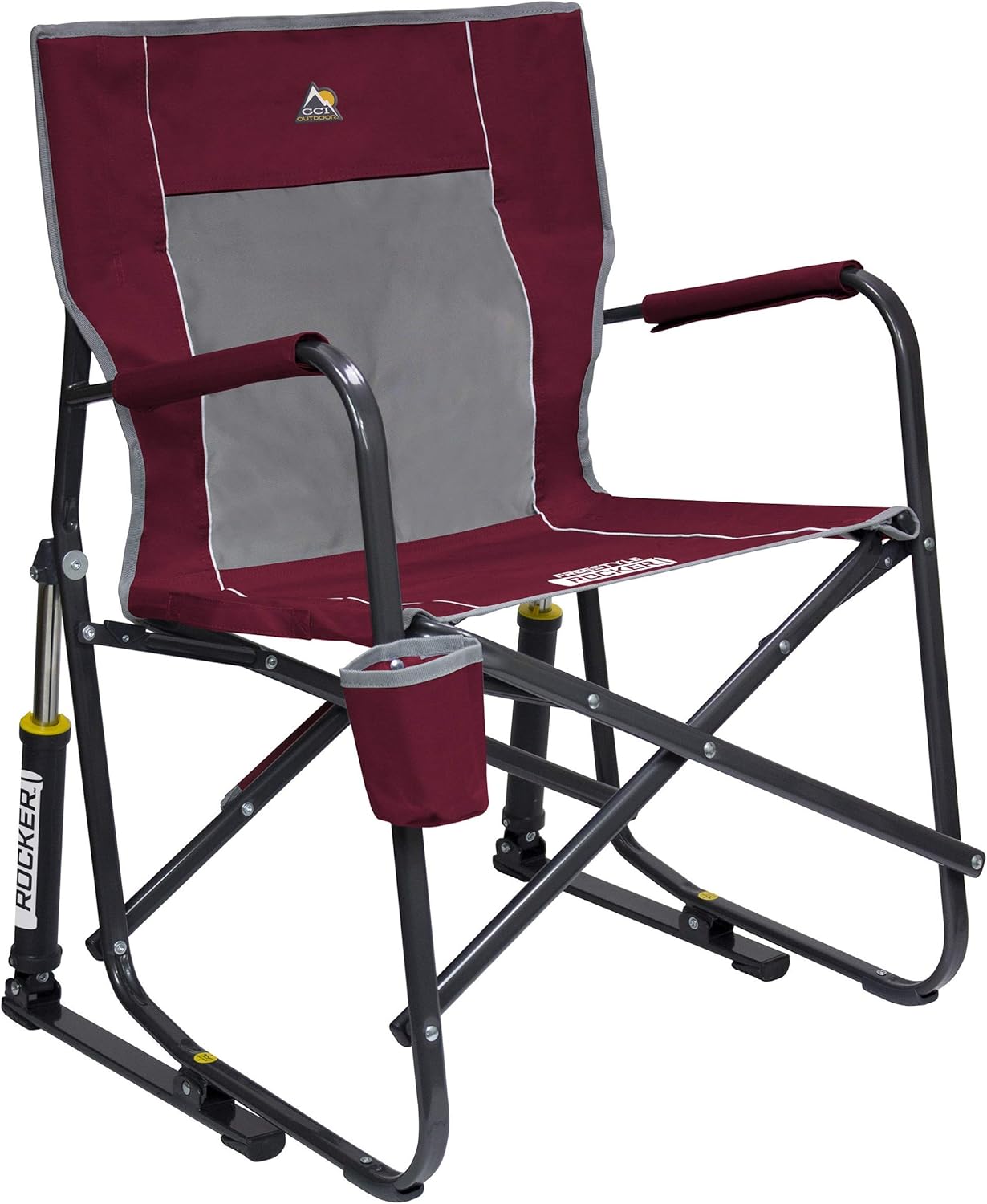

Leave a Reply